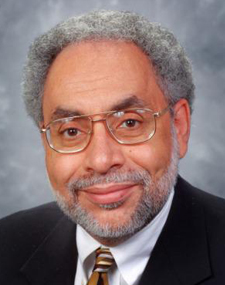National Black Men’s Health Network (founder)
Board certified, Public Health and General Preventive Medicine
 Dr. Bonhomme is Founder of the National Black Men’s Health Network and an expert on men’s health, minority health, the impact of poor men’s health on families.
Dr. Bonhomme is Founder of the National Black Men’s Health Network and an expert on men’s health, minority health, the impact of poor men’s health on families.
Positions Held:
- National Black Men’s Health Network, President, 1987-present
- Morehouse School of Medicine, Assistant Professor, Department of Psychiatry – present
- Apollo Addiction Recovery Center, 1996-present
- Emory University, Senior Faculty Advisor, Grace Crum Rollins School of Public Health, Department of Behavioral Sciences and Health Education, past
- Atlanta West Intake and Treatment Center, 1980-2000
- National Health Service Corps, Atlanta, Georgia 1981-1984
- Personal Commendation from City of Atlanta Police Commissioner Lee Brown for work with The Mental Health Task Force, a group of professionals brought together to deal with the psychological impact on the Atlanta Black community of the Missing and Murdered Children Crisis – 1981
From 2003 to the present, he has served as corporate president and Chairman of the Steering Committee for CHAMPS (Community Health and Men’s Promotion Summit), providing free health screenings to economically disadvantaged minority males. Also from 2003 to the present, he has served as staff physician for Toxicology Associates of North Georgia (TANG), a drug treatment facility based in Marietta, Georgia. From 2004 to the present:, he has served on the editorial board of the Journal of Men’s Health, and from 2006 to the present on the editorial board of the American Journal of Men’s Health.
Education:
- Bachelor of Arts Degree with Honors, College of the City of New York
- Doctor of Medicine, State University of New York at Stony Brook
- Postgraduate Medical Education: Categorical Internal Medicine & Psychiatry, Grady Memorial Hospital and Emory University Affiliated Hospitals.
- Master’s Degree, Public Health, Emory University, Field of Concentration: Epidemiology
Opening Statement
Good morning to everyone. I am Jean Bonhomme MD, MPH. I currently practice Preventive medicine in Atlanta Georgia and I am a former board member of the Men’s Health Network. Thank all of you for your time and your interest in this topic. The dissemination of valid, reliable and scientifically established information on the health of men and boys is an issue of paramount importance. I think we can all agree that historically, the health of men and boys has not received the level of attention it truly warrants.
Since the Men’s Health Network began this effort, the issues at hand concerning the health of men and boys have been impacted significantly. The COVID19 pandemic appeared seemingly out of nowhere and has spread with unanticipated rapidity. While COVID19 is generally considered singularly as a new viral disease, I believe that it may be conceptualized in more comprehensive terms as a triple pandemic.
First, there is the substantial morbidity and mortality inflicted directly by the virus itself. Second, beyond these clinical impacts, there is the economic crisis caused by the inability of businesses to function fully, job layoffs, inability to work, having to stay home to care for children who are out of school and many other problems that impact the financial health of individuals, families, communities and the nation as a whole. These two factors acting in concert have created the third pandemic, that of mental health problems. Suicide, substance abuse, drug overdose, divorce, domestic violence, isolation, bereavement, anxiety, depression, uncertainty, fear of homelessness, apprehension and many other mental health concerns have emerged. While the COVID19 pandemic has undoubtedly affected women severely in many respects, the fact is that male death rates have been higher during this pandemic. Also, because male identity is often strongly tied into work and ability to produce income it is having a particular detrimental mental health impact on men.
While the pre-pandemic health issues concerning men and boys still exist, it is likely that COVID19 will be with us for some time, and we must be prepared to address all these issues in this new situation. We accept this new challenge boldly.
